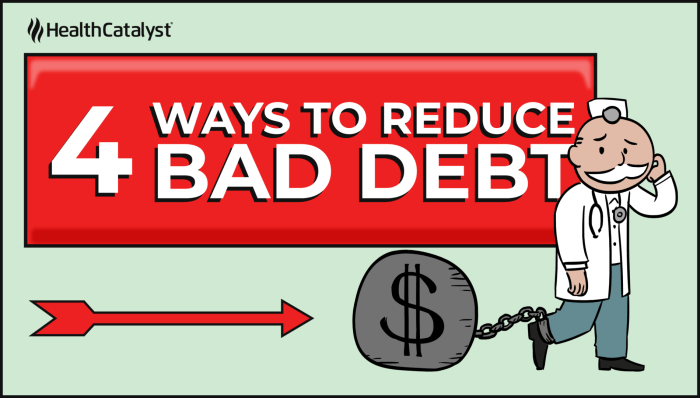Diving into the world of financial responsibility, this guide will show you the ropes on steering clear of bad debt. Get ready to take control of your finances and pave the way to a debt-free future.
Let’s break down the key strategies and tips to keep your wallet happy and your credit score soaring.
Understanding Bad Debt
Bad debt is money that is borrowed and not repaid, resulting in financial loss for the lender. It differs from good debt, which is used to invest in assets that can increase in value over time.
Common Sources of Bad Debt
Bad debt can arise from various sources, including:
- High-interest credit card debt
- Unpaid medical bills
- Defaulted student loans
- Auto loans for vehicles that lose value quickly
Impact of Bad Debt
Bad debt can have significant consequences on personal finances and credit scores. When debt goes unpaid, it can lead to:
- Decreased credit score
- Higher interest rates on future loans
- Difficulty obtaining new credit or loans
- Potential legal action from creditors
Importance of Budgeting
Creating and sticking to a budget is crucial in avoiding bad debt. A budget helps you track your expenses, prioritize your spending, and ensure you live within your means. It also allows you to save for emergencies and future goals, ultimately helping you avoid unnecessary debt.
Tips for Creating an Effective Budget
- Start by calculating your monthly income after taxes.
- List all your fixed expenses, such as rent, utilities, and debt payments.
- Identify variable expenses like groceries, dining out, and entertainment.
- Set limits for each spending category based on your income and financial goals.
- Track your expenses regularly to ensure you are staying within your budget.
Role of Budgeting in Managing Expenses
Budgeting plays a crucial role in managing expenses by providing a clear overview of your financial situation. It helps you identify areas where you may be overspending and allows you to make adjustments to stay on track. By sticking to a budget, you can avoid impulsive purchases and focus on your financial priorities, reducing the risk of accumulating bad debt.
Responsible Credit Card Usage
When it comes to avoiding bad debt, responsible credit card usage plays a crucial role in maintaining financial health. Credit cards can be powerful tools when used wisely, but they can also lead to debt if not managed properly.
Importance of Paying in Full
- Always pay your credit card balance in full and on time to avoid accumulating interest charges.
- Avoid making only the minimum payment, as it can result in a cycle of debt that is hard to break free from.
- By paying in full each month, you can enjoy the convenience of a credit card without falling into debt traps.
Setting Spending Limits
- Set a monthly spending limit on your credit card based on your budget and financial goals.
- Avoid maxing out your credit card, as it can negatively impact your credit score and overall financial health.
- Keeping your credit utilization ratio low can help improve your credit score and show lenders that you are a responsible borrower.
Monitoring Your Credit Card Activity
- Regularly monitor your credit card statements for any unauthorized charges or errors.
- Report any suspicious activity to your credit card issuer immediately to prevent fraud and protect your finances.
- By staying vigilant and proactive, you can prevent potential issues and maintain control over your credit card usage.
Emergency Savings Fund

Having an emergency savings fund is crucial in preventing bad debt. It acts as a safety net to cover unexpected expenses without having to rely on credit cards or loans, which can lead to debt accumulation.
Starting and Maintaining an Emergency Fund
When starting an emergency fund, aim to save at least three to six months’ worth of living expenses. Determine a realistic monthly savings goal and set up automatic transfers from your checking account to your savings account to ensure consistency.
Make sure to track your progress regularly and adjust your savings goal as needed. Avoid dipping into your emergency fund for non-essential purchases to maintain its purpose.
Amount to Save and Where to Keep the Emergency Fund
Experts recommend saving enough to cover major expenses like medical emergencies, car repairs, or sudden job loss. Consider factors like your monthly expenses, job stability, and health conditions when determining the amount to save.
Keep your emergency fund in a separate account from your regular savings to avoid temptation. Look for a high-yield savings account that offers a competitive interest rate while still providing easy access to your funds when needed.